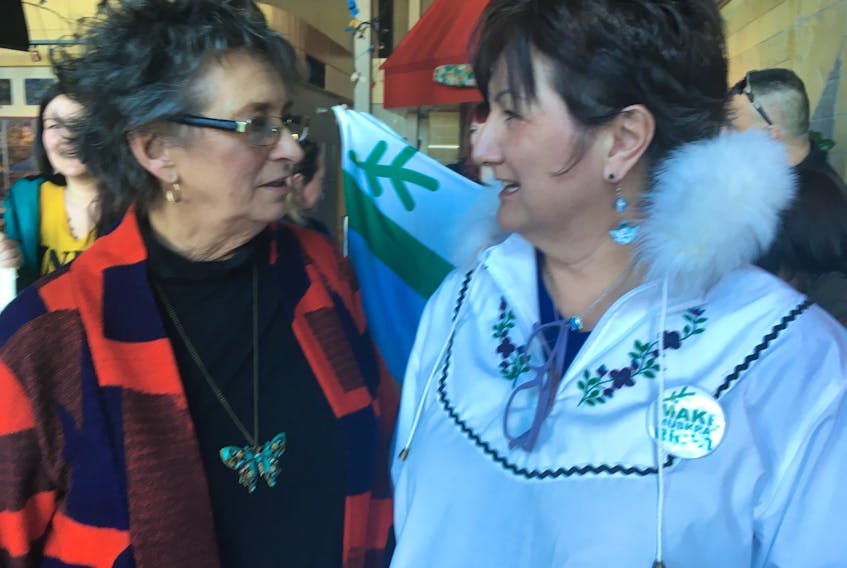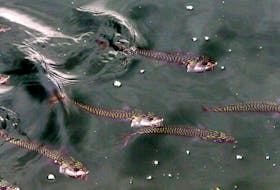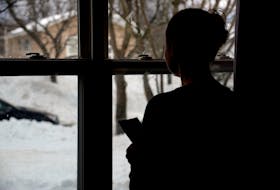HAPPY VALLEY-GOOSE BAY, N.L. — Marjorie Flowers sat under the lights, onstage at the Lawrence O’Brien Arts Centre in Happy Valley-Goose Bay. She tried to offer some snapshots from her life, during the construction of the Muskrat Falls project.
“I was shackled like an animal,” she said, recalling her arrest and incarceration in the provincial capital in 2017, along with fellow Labradorians Eldred Davis and Jim Learning.
They were not the only people to be arrested during the construction, mainly for violations of court injunctions related to access at the project worksites.
All eyes were on Flowers when she spoke Friday. Her comments were webcast live as part of the Muskrat Falls Inquiry.
She suggested being present at the public hearing, facing a stage full of lawyers and being recorded for the inquiry records and by the media, was not a desired experience. But she felt forced there, by the decisions made by Nalcor Energy and the Government of Newfoundland and Labrador to pursue and complete construction of the hydroelectric project, she said.
Flowers said the concerns of the local population have not been properly addressed when it comes to the project, including on the topic of methylmercury production and the creation of the Muskrat Falls reservoir.
She was on the stand as a witness alongside Roberta Benefiel, and the pair spoke for the Grand Riverkeeper Labrador and Labrador Land Protectors, respectively, about their active objections to the hydroelectric project on the Churchill River and non-violent protest of the project. They and other group members prefer to refer to them as protective actions.
Flowers said she has been in the audience during inquiry hearings and listened to exchanges on the construction schedule and project budget. She said her priority remains issues of health and safety.
Flowers and Benefiel both spoke about an increase in protest activities as the project progressed, emerging from ongoing frustrations over response to questions posed and issues raised.
“In reviewing that Environmental Impact Statement, it’s like nothing Nalcor could do could have any significant and adverse effects,” Benefiel said when speaking about the environmental assessment processes for the dam and transmission lines. Benefiel described struggling to gather and review thousands of documents and participate, then to get satisfaction once conclusions were released.
Flowers and Benefiel noted subsequent letter-writing campaigns, poster campaigns, motorcades and protest actions that shut down the office of Labrador Affairs, but still without requests being met; calls for additional review of expected methylmercury levels post-flooding; and an independent study of the stability of the area at the dam site known as the North Spur.
Outside the hearing room, land protector Amy Norman told The Telegram the project is a difficult topic as a whole at this point for many people, given the frustration that has built up.
“It’s so personal for us. Because when you talk about Muskrat Falls, you talk about all the issues caused by this project, you find the discussions – especially in the island part of the province – centre around the economics, things like that, which are obviously important, but here in Labrador, for us it’s not just about the money. It’s about who we are, it’s our cultures, it’s Indigenous sovereignty, it’s Mud Lake flooding, it’s our rivers, it’s our lifeblood. So there’s an extra layer of it that’s really, really personal,” she said.
During the day’s testimony, applause broke out at least three times in support of comments made by Benefiel and Flowers.
Another member of the Labrador Land Protectors, Erin Saunders, said she was feeling emotional in trying to comment during a break in proceedings, given calls to action – including for additional reservoir clearing – are still outstanding.
As Saltwire Network has reported, there has not been follow-through on recommendations from the Independent Expert Advisory Committee (IEAC), specifically on the suggestion in April 2018 for additional clearing at the reservoir. Indigenous leaders continue to have differing opinions on the benefits. The provincial government has yet to make a definitive statement.
“(It’s about) how the government and Nalcor is totalling ignoring us, and we’ve been trying to look for answers for years and we’re being ignored completely, and they just drag everything on and on,” Saunders said. “But I’m very proud of Marjorie and Roberta for speaking up this morning.”
During the day’s testimony, both Flowers and Benefiel also accused the current government, including Premier Dwight Ball, of not being responsive.
Lawyer Peter O’Flaherty, representing Ball and Natural Resources Minister Siobhan Coady, challenged that idea, asking both witnesses about what they knew of details behind the scenes – of commitments made to hunger strikers, and made in the “marathon meeting” of leaders in St. John’s that brought the protesters’ occupation of the site in 2016 to a close. It was that meeting that led to the creation of the IEAC.
O’Flaherty said the grassroots organizations had no direct representative there.
“Just to clarify, were you or Ms. Flowers present at that meeting (in St. John’s)?” he asked at one point, with both women indicating they weren’t.
He proceeded to note Indigenous leaders and Ball were there, and are also on the inquiry’s witness list.
As hearings concluded for the day, Benefiel and Flowers spoke to reporters. Flowers was asked what she would say to any people saying she was disrupting a multibillion-dollar public project, breaching an injunction and leading to extra costs.
“I would say that it’s not a green project, it’s not a well-researched project, it’s not a clean project, it’s not a safe project and they haven’t done anything to prove it. And it’s – what’s the words they use? – behind schedule and over budget. Let’s throw that one in there,” she said.
RELATED STORIES:
The Muskrat Falls Inquiry (Phase II)
The Muskrat Falls Inquiry (Phase I)
Inuit artist vows not to eat until Muskrat Falls reservoir is cleared
Protesters in St. John’s prison want forensic audit of Muskrat Falls
Targeted soil removal recommended for Muskrat Falls reservoir









